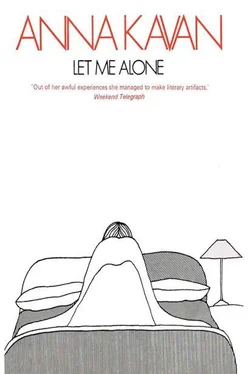Matthew and Anna went from stall to stall, with a man to carry their parcels. Anna bought silk for curtains, and some bowls and ornaments of black and gold lacquer, very Chinese-looking and dragonish, and white mats embroidered in coloured wools for the floor. Matthew went with her, inclined to scoff at her purchases. Rather domineering he was, and bargaining rudely with the sellers. Anna felt ashamed for him. He seemed churlish and uncouth beside the laughing, graceful people.
They went back to the car, and Anna looked round at the lovely press of colour, the brilliant skirts, the huge hats or the jaunty little head-scarves of the men, the golden piles of fruit, the heaped, vivid flowers, the goats and dogs, the pale, elegant bullocks — and she longed to make herself part of it, to take part in that life. But it was impossible for her to take part in it. It was as if she watched it all through a glass window. She could not come near.
If only she could get through the glass. She looked out on the rippling colours of the crowd. The sun was hot on her hands. Matthew was wiping his forehead with a blue handkerchief: he lifted his hat, and she saw his head for a second, black in the golden sunshine. The queer fish. She shuddered in distant repugnance.
And these brown-skinned creatures, what were they? She watched a youth who was passing, playing on a Chinese pipe. The little wail of sound came broken, weaving in and out of the market noises, very thin and clear. The bare, brown torso of the youth was beautiful, she saw the curious shadowy blueness of the tattooing on his slender thighs.
She looked at him, his black hair, his golden body — so close to her, so similar a being, yet so incredibly remote. How great a gulf must always divide her from him! And as she looked at him he turned his head; a sort of recognition flashed in his eyes, an acknowledgment of her. He was aware of her. And he was looking at her over his long pipe, watching with that open, smiling look. He smiled at her. He seemed to look at her with friendliness and good will, and frankly, freely, keeping his own dignity and freedom. He did not impinge on her. He kept his dignity and his restraint, his liberty, intact. And he left hers intact. She felt a quick glow of appreication for him, for his delicacy, his dignity. If only she could communicate with him. She felt him as a human being — one who would not humiliate her, or make demands upon her, or treat her unworthily. He blew a little personal tune for her, his dark eyes smiling. And he passed on. Why, oh why, was he on the other side of the glass?
‘We must get back,’ said Matthew. ‘I ought to be at the office by now.’
She looked at him. She looked coldly, dispassionately at him. She looked for the winsome quality, the suggestion of something pleasant about him which she had seen in the beginning. And now she could not see it, she knew that she would never see it again. Only she saw his obtuseness, his stupidity, his crudeness. He was uninteresting. He was nothing. She had got inside the parcel at last, and there was nothing there. The ultimate secret of her surprise packet revealed itself as a blank. He was nothing at all. She did not specially dislike him. But she resented having to live with him. Living with him was almost too much of an insult. Her cold, indifferent eyes watched him, and repudiated him. He would never be anything at all to her. Even though she yielded him her body.
She got into the front of the car, which was loaded up behind with the things they had bought. She heard the shred of a tune drifting over the noisy crowd, seeking her out.
‘Are you pleased with your shopping?’ Matthew asked.
‘Yes,’ she answered. She looked at him with grey, condemnatory eyes, wherein lurked a sardonic contempt.
‘All that silk stuff will go rotten as soon as the rains start,’ he said, a covert sneer in his voice. It hurt him all at once that the house was not good enough for her. It was good enough for him. He felt that she was slighting him.
They rattled back through the growing heat of the morning. It was very hot by the time they got back to the shabby, gloomy house. The servants came out to meet them. Matthew went indoors with Anna, while the parcels were being fetched from the car.
Anna looked at Matthew impartially. When they were inside, out of sight of the servants, he took her in his sinewy embrace. She saw the smooth, tough skin upon his cheek. And his hair, brittle and dry and lustreless, with a strange dead look, repulsive. How could she endure his embraces, how could she suffer him, and live? In the hot, tropical stillness she felt a chill. But the worst was over. She knew that there would be an end. Some time, she would shake off the nightmare and the marsh, and be for ever undismayed.
TIME went on. The brief, beautiful spell of winter weather was ending. Every day it grew a little hotter, the nights began to lose their freshness.
‘The hot weather will soon be here,’ Matthew said.
Anna stood outside, in the sparse and speckly shade of the tamarind trees which seemed to be always losing their leaves, and watched the big lizards basking on the branches and on the trunks of the trees. Some of the lizards shone blue like turquoise, they really seemed carved out of turquoise matrix, they glowed, they shone. And the other wrinkled, yellowish lizards were also like ancient carvings in precious gold. Minute after minute the dry, inscrutable, ancient-looking creatures hung motionless on the rough bark, as if waiting for something. Anna watched them, with her grey-blue eyes.
‘Shall we be here for a long time?’ she said to Matthew. ‘For always?’ She seemed to speak with a kind of impertinence, lost upon him.
‘Till I get transferred to another station.’
‘And when is that likely to happen?’
‘Perhaps not for years,’ he said indifferently. ‘I don’t know.’
‘I see.’ She had a slight smile on her face, secretive, slightly contemptuous, which he did not notice.
He now felt almost sure of her, almost safe. Only occasionally he was afraid of losing her. For the most part he thought he had safely caged her. He thought he had won. He did not realize how her spirit was set away from him. And she, when she saw his complacency, his obtuseness, she felt the old heavy suffocation, weary, hopeless despair, like a slow suffocation.
They lived in the same house. And she submitted herself to him. Outwardly she seemed apathetic, hopeless. But inwardly she trembled, she grew sick with the horror of his proximity. She felt she must die. Yet she did not really despair. She had in her some calm foreknowledge that kept her alive. She would escape, sooner or later.
But Matthew’s unreality affected her strangely. It seemed to make her unreal also. The strangeness of the place, of the bungalow, of the people at the club made her feel like an actor in some meaningless play. She was unreal. She was not herself. The real world she had left behind her; she was wandering now in a strangely lit, false world of unreality, imitation houses and painted landscape, and mouthing, unnatural people.
Quite unreal, quite out of herself, she went to the club, or sat in the lonely bungalow, mechanically, like a clockwork figure. She felt that Matthew had turned her into an automaton, destroying her individuality. It was his influence making her unreal.
She felt as though she had lost herself. Her personality was absent. She was like a mechanical thing moving about, with no real existence.
She appeared to be settling down. She now had two rooms more or less habitable, the drawing-room and her own room upstairs. These rooms were quite pleasant, with curtains of stiff, shot Mandalay silk, and bright rugs on the floor. And she had written for books to be sent her, she had books and papers to read.
Читать дальше












